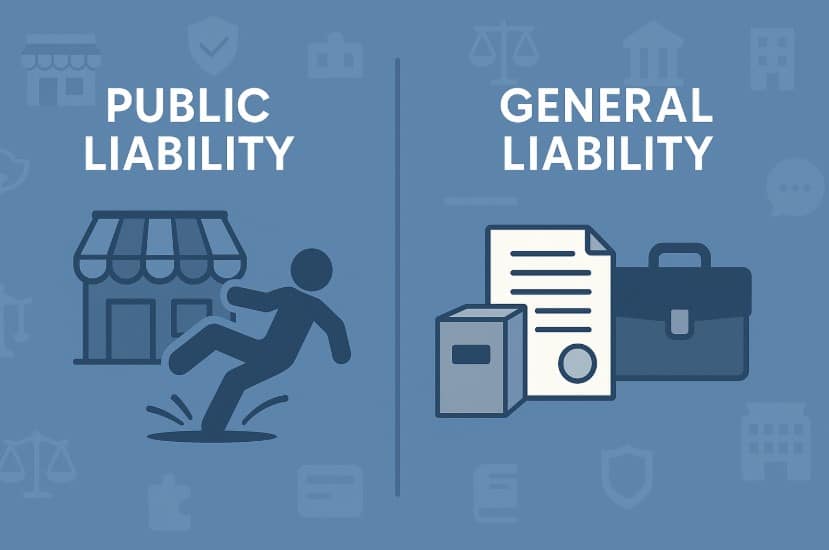When running a business in Malaysia, it’s critical to protect yourself from unexpected risks—especially those that involve injury, property damage, or legal claims. That’s why liability insurance is a core component of business risk management.
But with terms like public liability insurance and comprehensive general liability insurance being used interchangeably, many business owners find it difficult to understand the difference.
In this article, we’ll clarify what each type of insurance covers, how they differ, and which one your business might need. Whether you’re a contractor, manufacturer, service provider, or commercial landlord, understanding these policies will help you make a smarter, more secure decision.
What Is Public Liability Insurance?
Public liability insurance protects your business if a third party—such as a customer, supplier, or member of the public—suffers bodily injury or property damage due to your business operations.
It is especially relevant for businesses that:
- Interact frequently with customers or the general public
- Operate from a physical business premises
- Conduct work at customer locations
Typical Coverage Includes
- Slip-and-fall incidents at your business premises
- Damage to a client’s property while work is being carried out
- Legal expenses and compensation claims
Example: A customer trips on a wet floor in your store and injures their back. Public liability insurance would cover the medical costs and any legal claims made against your business.
In Malaysia, public liability insurance is often recommended for retail businesses, event organizers, F&B outlets, cleaning contractors, and property managers.
What Is Comprehensive General Liability Insurance?
Comprehensive general liability insurance (CGL) goes a step further. It includes public liability coverage, but also offers protection for a broader range of business-related risks.
It is designed for businesses with more complex risk exposures—especially those involving products, ongoing projects, or operations that affect multiple parties.
Additional Coverage in CGL May Include:
- Product liability: Claims from injuries or damage caused by products your business manufactures or sells
- Completed operations: Liability for work you’ve completed that later causes harm (e.g., a plumbing job that results in water damage weeks later)
- Contractual liability: Liability assumed under the terms of a contract
- Tenant’s legal liability: Damage to rented premises caused by your business activities
Example: A construction firm completes a renovation job. Months later, a poorly installed ceiling panel falls and injures the occupant. A CGL policy would cover this post-completion liability.
Side-by-Side Comparison
Feature | Public Liability Insurance | Comprehensive General Liability Insurance |
Coverage Scope | Injury or damage to third parties | Broader coverage including public, product, and completed ops |
Typical Users | Retailers, service providers, event organizers | Contractors, manufacturers, businesses with higher risk |
Product Liability | ❌ Not included | ✅ Included (if specified) |
Completed Operations | ❌ Not included | ✅ Covered |
Contractual Liability | ❌ Not included | ✅ Often included |
Cost | Lower premiums | Higher premiums (due to broader scope) |
Customisation | Limited | Highly customizable |
Public Liability Insurance in Malaysia: Is It Enough?
For many small or local businesses in Malaysia, a standalone public liability insurance Malaysia policy may be sufficient—particularly if the operations are low-risk and there is no product liability or subcontracted work involved.
However, if you:
- Manufacture or distribute physical products
- Provide services that may cause property damage after completion
- Enter into business contracts that require broader liability terms
- Work in high-risk industries like construction or engineering
Then comprehensive general liability insurance is the more appropriate and protective option.
Why the Confusion?
In some countries, the terms “public liability” and “general liability” are used interchangeably, especially for basic business insurance packages. But in Malaysia and most global commercial insurance markets, they are distinct policies with different scopes.
It’s important to clarify with your insurer or broker which coverages are included in your policy—and which are not.
How to Choose the Right Coverage for Your Business
1. Assess Your Risk Exposure
Look at your day-to-day operations, customer interaction, product involvement, and subcontracted services.
2. Check Industry Requirements
Some industries or clients may mandate a certain level of coverage before doing business with you.
3. Review Contracts Carefully
Many commercial contracts require businesses to carry general liability insurance—not just public liability—especially in construction or supply chain agreements.
4. Get Expert Advice
Work with a knowledgeable insurance advisor who understands the Malaysian business landscape and can customize your policy to match your exact needs.
Minaris: Your Partner in Business Risk Protection
At Minaris, we help Malaysian businesses find the right balance between coverage and cost. Whether you need straightforward public liability insurance Malaysia or a broader comprehensive general liability insurance plan, our experienced team is here to guide you through every step.
We also offer tailored solutions for:
- Contractors and developers
- Manufacturers and distributors
- Retail and service businesses
- SMEs expanding their operations
Contact us today for a risk consultation or to request a customized quote.
Final Thoughts
Understanding the difference between public liability and comprehensive general liability insurance is more than just insurance jargon—it’s about protecting your livelihood.
As your business grows, so do your liabilities. Having the right policy in place ensures you’re prepared for the unexpected, protects your reputation, and keeps your operations running smoothly.
When in doubt, consult with an expert and build a liability strategy that grows with your business.

KH Chew is the Founder and Risk Advisor of Minaris, with over 30 years of experience in the insurance industry. He holds a Diploma in Insurance from the Malaysian Insurance Institute (MII), which laid the foundation for his in-depth expertise in property, financial lines, and other general insurance products. He is widely recognized for developing tailored insurance schemes for professionals and businesses across Malaysia. KH is also a passionate advocate for risk management and regularly advises clients and trade associations on comprehensive coverage strategies.

